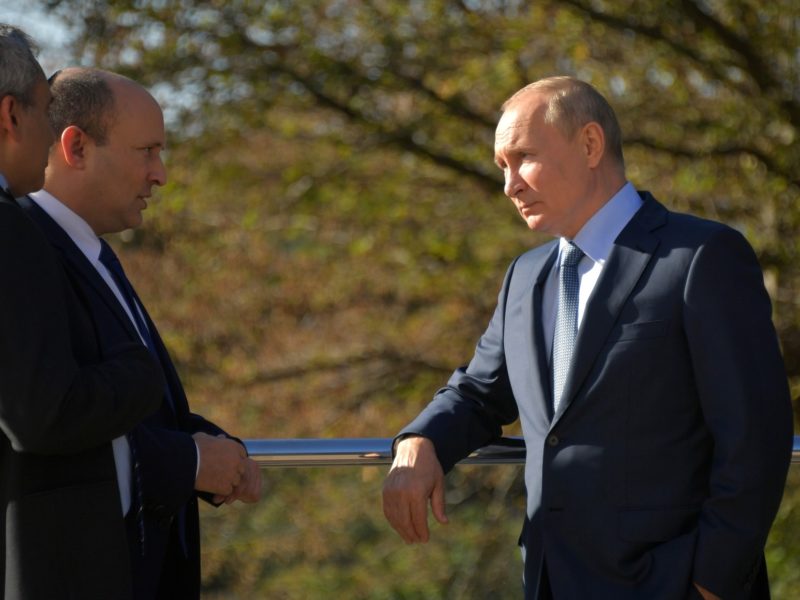PVG Viewpoint by Michael Barnett
Israel is getting some unwanted attention because of its reluctance to outrightly condemn the Russian invasion of Ukraine. No one believes that the failure to condemn translates into support for the attack. But Israel’s reticence has placed it in an awkward situation—one that might, in fact, translate into a loss of support from Western countries when Israel needs it most.
Israeli officials have identified two principal reasons for its neutrality. A neutral stance was in the best interest of peace because Israel can potentially mediate between Russia and Ukraine. Israel is one of the few countries that had reasonably good relations with Russia. Russian President Putin has been willing to take the Israeli Prime Minister Naftali Bennett’s phone calls, which Bennett presented as a precious resource because Putin cut himself off from the outside world. Bennett also has a direct line to Ukrainian Prime Minister Zelensky. Bennett, in fact, visited Moscow and Kyiv in early March. This attempted mediation did little if anything, but it was better than nothing and if Israel can possibly play a positive role because of its neutrality, then its neutrality might be in the best interest of peace.
Israel also says that neutrality is in its self-interest, because Israel needs to maintain friendly relations with a Russia that rules the skies over Syria. Syria might have been neutralized as an active threat to Israel because of its civil war, but the presence of Iran in Syria raises Israel’s security threat. Israel and Iran are sworn enemies. Iran has proclaimed that its nuclear weapons program is directed at Israel, and Israel has warned that it will launch a military attack before Iran has the chance to get the bomb.
Iran has repeatedly stated its wish to destroy Israel, a threat that Israel must take seriously. When Iran’s military forces were across the Persian Gulf, its military threat was serious but limited. Now that it has bases in Syria, it is a major concern. Israel has a deep interest in neutralizing this threat, and the best way to do so is from the air. But to cross into Syrian air space is tantamount to crossing into Russian air space, which means that Israel must get Russia’s permission before entering Syrian skies. So far Russia has been accommodating, and Israel needs it to stay that way, which means staying on Russia’s good side. An outright condemnation of Russia’s invasion of Ukraine might possibly come at a high cost to Israeli security.
Western countries did not fully accept Israel’s defense of its neutrality, but they did not outrightly challenge it during the first few weeks of the war either. They were skeptical that Bennett would be able to persuade Putin of anything, but thought it worth a try. But as the war moves into its second month, Israel’s claim that it stands ready to mediate, if and when needed, looks increasingly like a fig leaf for self-interest. There is sympathy for Israel’s security needs, but everyone in the West is risking something. Big causes call for big sacrifices. The NATO countries have stuck their necks out, including the possible risk of nuclear war.
In a recent series of tweets, Representative Adam Kinzinger (R-Illinois) admonished Israel to “pick a side.” There is good and evil. Russia is clearly evil. And Israel needs to decide where it stands. He was following the trail blazed by Zelensky in his speech to the Israeli Knesset, in which he challenged Israel to stop using mediation as an excuse for indifference and join the fight for good. Speaking as a Jew who lost family in the Holocaust, he challenged Israel: “You can mediate, but cannot mediate between good and evil. I could ask why we are not receive [sic] protection from Israel? Why are we not getting your Iron Dome, that would protect the Jews of Ukraine? Why hasn’t Israel joined the sanction regime against Russia?”
What will be the consequence of an Israel that clings to neutrality in a fight that is now widely viewed in Manichean terms? Kinzinger, Zelensky, and others are questioning whether Israel is with “us or them.” Is it a member in good standing of the West, or is it a member only when it is convenient? Durable alliances are built not only on interests but also on shared values; Israel has repeatedly trumpeted its liberal values as a way of tying itself to the West and generating military, economic, and diplomatic support. If the West used self-interest to decide whether to support Israel, then Israel might find that the West is no longer there when it is needed. Western voices are pointedly asking Israel to demonstrate its membership in the West by sacrificing like everyone else. Anything less will call into question whether Israel is part of the West and its liberal values.
This line of questioning would not be so ominous if Israel’s Western credentials were unimpeachable. But they are not. Those in the Western club believe themselves to have a shared faith in liberal democracy, and anyone who wants to be part of the club must not waiver or exhibit illiberal tendencies. But Israel’s commitment to liberalism, democracy, and human rights is being called into question by various human rights groups and even those who count themselves as staunch friends of Israel. And whereas it was once unthinkable to mention Israel and apartheid in the same sentence, it is becoming increasingly thinkable and mentionable, and is getting a serious hearing.
The foreseeable danger for Israel is that its rule over the Palestinians and failure to condemn Russia’s invasion will add numbers to those who question whether Israel deserves the nearly unconditional support of the United States and other Western countries. Interests count, but so do the values that shape the boundaries between “us” and “them.” Israel wants to have it both ways at a time when the West has made Ukraine a moment of truth for the West.







